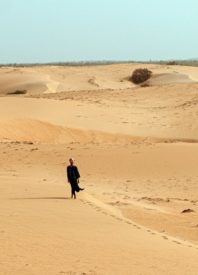
Jared P. Scott is building quite the CV of environmental documentaries. This time around, he takes audiences to a continent that is both vulnerable and full of potential – Africa. In doing so, he takes a step back and lets someone else take over. That person taking over is Inna Modja, a musician and activist who takes a trip through the titular Great Green Wall. Heads of state have proposing that wall since the 1950s, but the film shows the origins of the idea from the 1980s. Generations later, Modja visits the building blocks of the wall while discussing why this wall is necessary.
One of these sites is in Modja’s home country, Mali, where political leaders try to build something out of the borders of the Sahara. These leaders call some of these sites ‘plantations,’ a word denoting something painful to a Western context. Reclaiming that word is one of the latent purposes of this film, but it places bigger concerns like how much progress those sites are producing. One site plans to plant 2.5 million trees each year. This initiative, among many things, invite Malians to stay in Africa and remind Africans that its past riches manifest through its environment.
Most of Modja’s conversations spring out as a product of her trips within the wall. Those conversations feel spontaneous, while others don’t. A lot of Modja’s life and work, and thus this film, is music. She’s trekking across the wall. She might as well collaborate with fellow socially conscious musicians in countries like Senegal and Nigeria. There’s nothing vain about this project. But maybe it’s my inherent prejudices in environmental docs where I assume scientific content instead of artistic ones. Or maybe the film isn’t the best at showing how political and environmental initiatives and genre talk belong together.
“Because we are born African, we shouldn’t be living this”. Those are Modja’s words to her fellow Malians who find themselves stuck in Niger. We can write whatever we want about this film’s musical interludes. But it shows how much it means to her for these refugees to have a reason to return home. Her journey’s not the most comprehensive neither but it’s inter-sectional, connecting climate change with her own trauma as an African woman. She also ends it on a high note in Ethiopia. Scott juxtaposes archive footage of Ethiopia’s drought with the country right now, bountiful in previously dry land. He, along with Modja, hopes for the same in all of Africa.
Learn more abut The Great Green Wall in Africa here.
- Release Date: 7/30/2020

